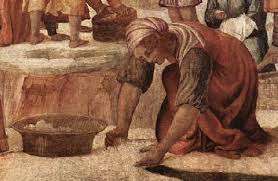

Greed Among the God's People: Old Testament
Dr. K. G. Jose
Greed and the Bible
Even though we do not consider greed so serious, the Bible looks at it differently. It is a “desire for more than one needs or deserves.” It does not refer merely to material things but hunger for power, striving for power, effort to take the greater share, to take advantage of any situation, will to press one’s advantage, selfishness or seek something by force. Greed is not just a social evil, but rather the greatest evil. The greedy become the enemy of all. Their inter-personal relationship will not last as they try to manipulate every human or divine relationship merely for personal gain. The ideal of being without needs helps to escape greed. Thus, the wealthiest person is the one with minimum needs and the poorest are the greedy who do not know how much they need. Philosophy teaches one to be above greed.
The Bible uses this term to mean eager, unrestrained, insatiate longing, particularly for wealth or gain. It is also used to mean craving for food and drink. It is a serious sin in the Bible which is identified as idolatry (Eph 5:5; Col 3:5). And the one greedy for gain curses and renounces the Lord (Pss 10:3). The last commandment is a warning against the greedy (Ex 20:17). According to Jer. 22:17 greed sets aside the rights of others. Greed is the source of an unhappy life. They lose everything in search for more. Greed leads to foolish lusts. Our view of material things is godliness with contentment. Welcoming with equanimity, pleasure and pain, acquisitions and losses, victory and defeat are the quality of a man of God. Greed consumes not only time and energy but also values.
Jubilee
The most important control over human greed among the people of God is the law of Jubilee. The word "jubilee" is derived from the Hebrew word 'jobel,' which means "ram's horn"; since it was precisely that horn which was used as a trumpet, whose sound indicated to everyone the beginning of the Jubilee Year. During the Day of Atonement, the blowing of a ram’s horn would indicate that the Year of Jubilee began (Num 36:4). The book of Leviticus tells us the significance of the jubilee year, a year of liberation "par excellence," which is at the end of seven weeks of years, the fiftieth year (Lev 25:8-10). The sources of these laws are found in Leviticus 25, Exodus 34 and Deuteronomy 16.
Leviticus 25 ordains a sabbath year, one in every seven (Lev 25:1-7), and a jubilee year, one in every fifty (25:8-17), to sanctify Israel’s internal economy. During this year, the Israelites were not supposed to reap or harvest; it was a time for people to return to their families. The Bible places a special emphasis on the number 7. After all, there are seven days in a week, and the seventh day is supposed to be the Sabbath, a day dedicated to rest and worship: 7 x 7 = 49 years. After seven years of Sabbaths, they reach the 50th year. In the sabbath year, each field was to lie fallow, which appears to be a sound agricultural practice. The year of jubilee was much more radical. Every fiftieth year, all leased or mortgaged lands were to be returned to their original owners, and all slaves and bonded laborers were to be freed (25:10). The underlying intent is the same as seen in the law of gleaning (Lev 19:9-10), to ensure that everyone had access to the means of production, whether the family farm or simply the fruits of their own labor.
The feasts of the Hebrew calendar are also marked by seven days; such is the duration both of the feast of the unleavened (bread) and of the feast of the tabernacles. The feast of Pentecost is celebrated seven weeks after the Saturday of Passover. Because everyone was released from debts and slavery, everyone got to rest during this year and was able to start off the next year with a clean slate. It was to ensure that everyone has access to the means of making a living and escaping multi-generational poverty.
In the 7th and 8th years the people were to live on what the fields had produced in the 6th year and whatever grew spontaneously. This shows the reason why we may say that one of the factors constituting the Jubilee Year was the "simple life." They could not help but live simply for two consecutive years. Nobody can deny that this afforded ample opportunity to develop the habit of living within very limited means. It was not the simple life as such that He had in view, but rather the laying down of its moral and religious foundations. "What shall we eat in the seventh year?" "Then I will command my blessing upon you,". There is no simplicity of life without true faith in Him. Perhaps they signally failed in it, and if so, we should not be surprised at all. Not that the institution in itself was cumbered with any obstacles that could not have been overcome; but what is more common than unbelief and unwillingness to trust absolutely in Yahweh?
Jubilee clarifies how faith in God also carries Israel's culture, in work, and in relationships. It is not tolerable that, because of debt or poverty, a family or a father be deprived of his land forever, since the land comes from God and is a fruitful gift for man. From this, the detailed divine laws which idealistically intervene to promote justice and hope. The orientation is clear: it questions, challenges, presses to accept the gift and to promote a culture of freedom. An Israelite may only be held for a maximum of six years before he is released. He cannot be a slave in the full sense of the word but can only be a bonded laborer.
The Context of Debt and Loss of Land
There are certain life situations that make one to fall into debt. The first is the context of a person could simply become poor. A farmer who borrowed money from the neighbor to buy seed but did not harvest enough to repay the loan. He therefore must sell some of the land to a buyer in order to cover the debt and buy seed for the next farming. If there was a person who belonged to the farmer’s clan who wished to act as a “redeemer”, he could pay the buyer according to the number of remaining annual crops until the jubilee year when it reverted to the farmer. Until that time, the land belonged to the redeemer, who allowed the farmer to work it.
Secondly, when the land was not redeemed and the farmer again fell into debt from which he could not recover, he would forfeit all of his land to the creditor (Lev 25:35-38). The creditor must lend the farmer the money necessary to continue working as a tenant farmer on his own land, but must not charge him interest. The farmer would amortize this loan with the profit made from the crops, perhaps eliminating the debt. If the loan was not fully repaid before the jubilee, then at that time the land would revert back to the farmer or his heirs.
Thirdly, when the farmer could neither pay on the loan or even support himself and his family, he would become bound to the creditor (Lev 25:39-43). As a bond laborer he would work for wages, which were entirely for reduction of the debt. At the year of jubilee, he would regain his land and freedom. Throughout these years, the creditor must not treat him as a slave, sell him as a slave, or rule over him harshly. The creditor must “fear God” by accepting the fact that all of God’s people are God’s slaves.
The Principle of Restoration
The year of jubilee operated within the context of Israel’s kinship system for the protection of the clan’s inalienable right to work their ancestral land, which they understood to be owned by God and to be enjoyed by them as a benefit of their relationship with Him. The People who sold themselves must retain the right to buy themselves out of slavery if they prospered. If not, a near relative could intervene as a “redeemer” who would pay the foreigner according to the number of years left until the jubilee when the impoverished Israelites were to be released.
There is a dispute between two systems of land ownership, inheritance and possession. This difference is rooted in a dispute between Yahweh and Baal. Yahweh is the champion of land as inheritance; Baal is the sponsor of land as possession that leads, in turn, to commoditization. The jubilee affirms that the Lord is not only the God who owns Israel’s land; He is sovereign over everything. His act of redemption from Egypt committed Him to provide for them on every level because they were His own. Therefore, Israel’s observance of the Sabbath day and year and the year of jubilee was a function of obedience and trust. It also calls on the rich to trust that treating creditors compassionately will still yield an adequate return.
The smallest unit of Israel’s kinship structure was the household that would have included three to four generations. The jubilee provided a socio economic solution to keep the family even in the face of economic calamity. Family debt was a reality in ancient times as it is today, and its effects include a frightening list of social ills. The jubilee sought to check these negative social consequences by limiting their duration so that future generations would not have to bear the burden of their distant ancestors. God desires just distribution of the earth’s resources. The land of Canaan was assigned equitably among God’s people. The jubilee was not about redistribution but restoration. The jubilee was a critique against private accumulation of land and large-scale forms of nationalization that destroy family ownership.
After the bitter experience of the Babylonian exile, when they lost the land, the temple and their own consistency as a people; a horizon of hope and freedom opened up (Isa 61:1-3). The prophet heralds a year of the Lord's favor which is liberation and consolation. Liberation is from physical evils and consolation is a transformation to joy. City, countryside, experiences of rural work and sheep farming are tied up in a novelty of life more human and more constructive.
Its widespread neglect occurred not because the jubilee was unfeasible, but because the wealthy were unwilling to accept the social and economic implications that would have been costly and disruptive to them. In essence, any sale of land was really a term lease that could last no longer than the next year of jubilee. This provided a means for the destitute to raise money without depriving the family’s future generations of the means of production.
God Loves Rest
The Lord marks the times of work and of rest. This matters because God takes rest seriously. He doesn’t want His people to make work an idol, thinking that if they plant and harvest enough, they can provide for their needs on their own. No matter what rest looks like, God wants His people to trust Him each week, each month, and each year. It would make sense for God to institute a year of rest. He establishes a weekly Sabbath because He doesn’t want us to rely on our own work to sustain us fully. He asks to trust Him to provide when we cannot provide for ourselves. A Year of Jubilee tells us that we are not machines but created to enjoy creation and God. God does not approve of anything that holds humans in bondage. The observance of the sabbatical year–which included rest for the land, freedom for Hebrew slaves and cancellation of debts for the poor–should have functioned to reduce the gap between rich and poor.
Rest meant that their wandering in the wilderness had come to an end and Israel could enjoy security, even though surrounded by enemies (Pss 95:7-11; Heb 3:7-4:11. Mat 11:28-29). On the one hand, ‘rest’ may be experienced now by everyone who becomes a follower of Jesus and finds ‘rest for the soul’, even though they still live in a world which is full of uncertainty and far from secure.
It’s important to note that God owns everything. Therefore, the Israelites would dedicate this year of rest to him, acknowledging that God would provide for their needs. Vegetation won’t grow if people overwork the land. Therefore, by instituting the year of rest, the land has time to recover and produce a bountiful harvest in future years to come. In fact, part of the reason the Israelites went into captivity was that they didn’t observe Jubilee. They didn’t trust that God would provide, and dedicate time to resting.
One of the great themes of the sabbatical and jubilee years in the Bible is freedom. The people of God should be able to enjoy the freedom which he has given them, and if that is not the case then action must be taken to restore that freedom, liberation of slaves and provision of capital so that they can make a new start as free men and women. The Bible does not only promise better things in heaven for the oppressed but encourages concrete action to bring them freedom from suffering in this world.
Restoration of all that which in the course of time was perverted by man's sin, in the removing of all slavery of sin, in the establishing of the true liberty of the children of God, and in the delivering of the creation from the bondage of corruption to which it was subjected on account of man's depravity. They should never lose sight of their being brothers and citizens of theocratic kingdom. They owed their life to God and were subject to His sovereign will. Only through loyalty to Him were they free and could ever hope to be free and independent of all other masters.
Failure and Judgment
The jubilee year was observed but only irregularly. Jewish tradition, as preserved in the Talmud, assumed that the sabbatical and jubilee years were observed regularly in Israel until the Exile; but after that the jubilee year became irrelevant because the Judeans no longer lived on their original family property as assigned when they first entered the promised land. It would appear that the jubilee year was not observed regularly in ancient Israel. However, the values enshrined in the institution were clearly important for the people. They understood land as family property, on the basis of their conviction that the land was given by the Lord God to his people. Therefore, they were reluctant to buy and sell land, though no doubt it did happen on occasions; and there are several examples of the redemption of family property in the OT.
In Isaiah 61:1-3 the messianic age is described as ‘the year of the Lord’s favor’ (v. 2a), an idea which draws at least some of its inspiration from that of the Jubilee. One of the prophet’s tasks is to ‘proclaim liberty’, a distinctive phrase found in the jubilee regulations. In the messianic age, according to the prophet’s message, the poor and the oppressed will be freed from their suffering (Isa. 61:2b–9). The expression ‘day of vengeance of our God’ seems to indicate that freedom for the oppressed will be accompanied by judgement on the oppressors. In accordance with the principle of ‘restoration’ in the jubilee year, ruined cities and deserted habitations will be restored (v. 4).
There are many similarities between Isa 58 and the jubilee regulations. The chapter is opened with the simile of a trumpet (v. 1). The theme of the chapter is true fasting (vv. 3–6), the only fast legislated for in the Law is the Day of Atonement (Lev 16:29-31), and the jubilee year begins precisely on the Day of Atonement (Lev 25:9). True fasting is to provide shelter, food and clothes for the poor, and not to close their eyes to the needs of their fellow Israelites, matters which are also mentioned in the regulations for the jubilee year.
Conclusion
Is there an hour you can set aside, rest and be with God? The purpose of the Year of Jubilee is to turn our anxieties away from our debts, our jobs, our busy lives, and reflect on God as our provider. Jesus described himself as having come to "preach the year of the Lord's favor" (Isaiah 61: 1-2) in jubilee year.
When we understand Jesus’ resurrection as the inaugural act of “remaking” in God’s creation it becomes clear that God’s people are meant to be a foretaste of what God wants to do for the entire creation. The church is called to be a new community that marks the kingdom of God breaking into the world. Jubilee reminds us that God expects the church to challenge worldly imperfection through their relationships with each other and the pursuit of justice.
A Spirit-filled church which is committed to discipleship will actually care for the poor because that’s all in the year of Jubilee. The essence of Jubilee is God’s inspired vision to interrupt the status quo and reset the way of life for God’s redeemed and liberated people, emphasizing the relationships between humanity, creation and God. Within the reality of life in a world of broken relationships, Jubilee is an expression of God’s desire for all of creation to flourish.











